[英语时文阅读 中英文对照] 《哈佛商业评论》专家论点:管理,并不是一种职业
- 格式:pdf
- 大小:188.02 KB
- 文档页数:13
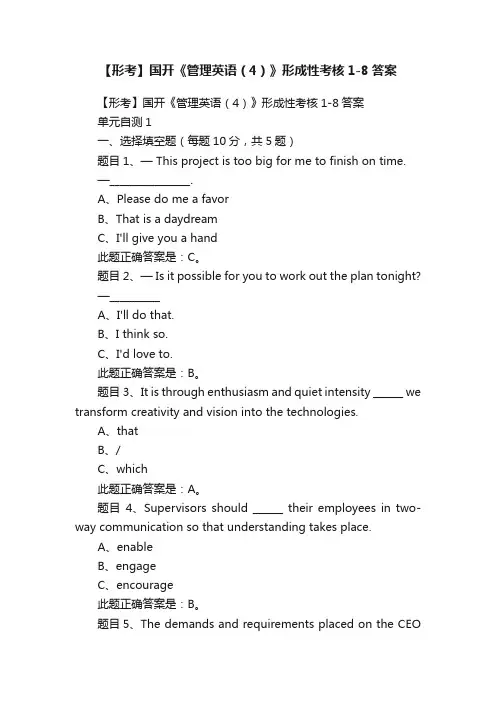
【形考】国开《管理英语(4)》形成性考核1-8答案【形考】国开《管理英语(4)》形成性考核1-8答案单元自测1一、选择填空题(每题10分,共5题)题目1、— This project is too big for me to finish on time.—________________.A、Please do me a favorB、That is a daydreamC、I'll give you a hand此题正确答案是:C。
题目2、— Is it possible for you to work out the plan tonight?—__________A、I'll do that.B、I think so.C、I'd love to.此题正确答案是:B。
题目3、It is through enthusiasm and quiet intensity ______ we transform creativity and vision into the technologies.A、thatB、/C、which此题正确答案是:A。
题目4、Supervisors should ______ their employees in two-way communication so that understanding takes place.A、enableB、engageC、encourage此题正确答案是:B。
题目5、The demands and requirements placed on the CEOof Sony are different from ______ on the manager of your local Wendy's restaurant.A、theseB、thoseC、which此题正确答案是:B。
题目6二、阅读理解:根据文章内容,判断正误(共50分)。
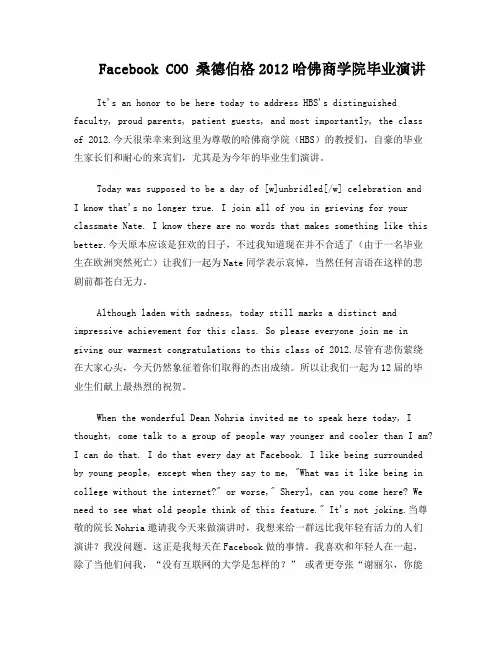
Facebook COO 桑德伯格2012哈佛商学院毕业演讲It's an honor to be here today to address HBS's distinguished faculty, proud parents, patient guests, and most importantly, the class of 2012.今天很荣幸来到这里为尊敬的哈佛商学院(HBS)的教授们,自豪的毕业生家长们和耐心的来宾们,尤其是为今年的毕业生们演讲。
Today was supposed to be a day of [w]unbridled[/w] celebration andI know that's no longer true. I join all of you in grieving for your classmate Nate. I know there are no words that makes something like this better.今天原本应该是狂欢的日子,不过我知道现在并不合适了(由于一名毕业生在欧洲突然死亡)让我们一起为Nate同学表示哀悼,当然任何言语在这样的悲剧前都苍白无力。
Although laden with sadness, today still marks a distinct and impressive achievement for this class. So please everyone join me in giving our warmest congratulations to this class of 2012.尽管有悲伤萦绕在大家心头,今天仍然象征着你们取得的杰出成绩。
所以让我们一起为12届的毕业生们献上最热烈的祝贺。
When the wonderful Dean Nohria invited me to speak here today, I thought, come talk to a group of people way younger and cooler than I am?I can do that. I do that every day at Facebook. I like being surrounded by young people, except when they say to me, "What was it like being in college without the internet?" or worse," Sheryl, can you come here? We need to see what old people think of this feature." It's not joking.当尊敬的院长Nohria邀请我今天来做演讲时,我想来给一群远比我年轻有活力的人们演讲?我没问题。
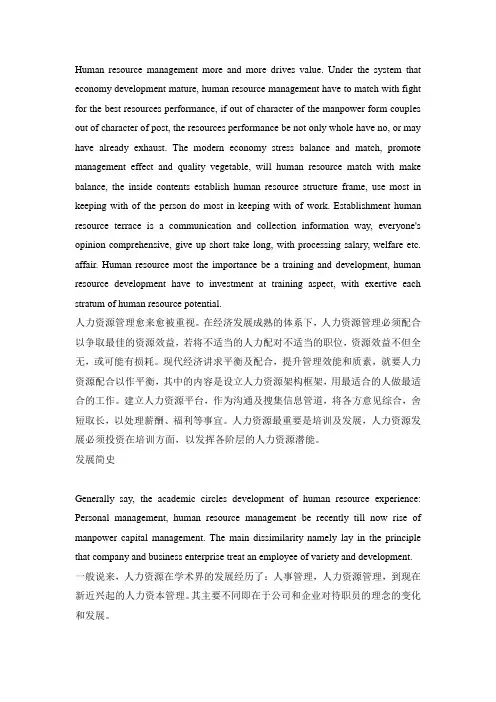
Human resource management more and more drives value. Under the system that economy development mature, human resource management have to match with fight for the best resources performance, if out of character of the manpower form couples out of character of post, the resources performance be not only whole have no, or may have already exhaust. The modern economy stress balance and match, promote management effect and quality vegetable, will human resource match with make balance, the inside contents establish human resource structure frame, use most in keeping with of the person do most in keeping with of work. Establishment human resource terrace is a communication and collection information way, everyone's opinion comprehensive, give up short take long, with processing salary, welfare etc. affair. Human resource most the importance be a training and development, human resource development have to investment at training aspect, with exertive each stratum of human resource potential.人力资源管理愈来愈被重视。
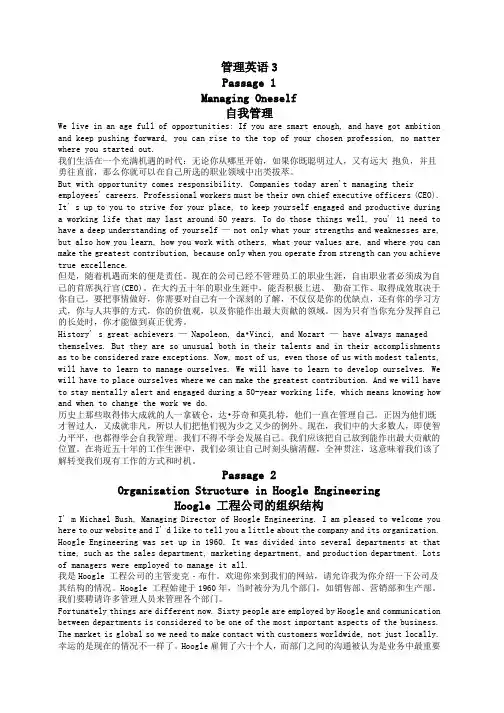
管理英语3Passage 1Managing Oneself自我管理We live in an age full of opportunities: If you are smart enough, and have got ambition and keep pushing forward, you can rise to the top of your chosen profession, no matter where you started out.我们生活在一个充满机遇的时代:无论你从哪里开始,如果你既聪明过人,又有远大抱负,并且勇往直前,那么你就可以在自己所选的职业领域中出类拔萃。
But with opportunity comes responsibility. Companies today aren't managing their employees' careers. Professional workers must be their own chief executive officers (CEO). It' s up to you to strive for your place, to keep yourself engaged and productive during a working life that may last around 50 years. To do those things well, you' 11 need to have a deep understanding of yourself — not only what your strengths and weaknesses are, but also how you learn, how you work with others, what your values are, and where you can make the greatest contribution, because only when you operate from strength can you achieve true excellence.但是,随着机遇而来的便是责任。
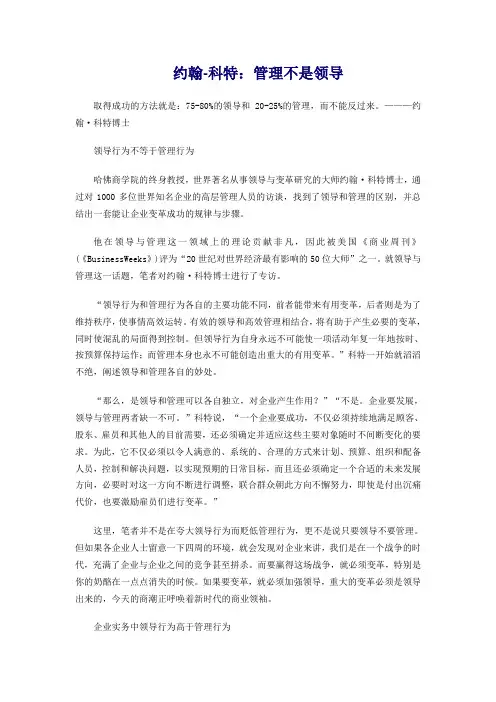
约翰-科特:管理不是领导取得成功的方法就是:75-80%的领导和20-25%的管理,而不能反过来。
———约翰·科特博士领导行为不等于管理行为哈佛商学院的终身教授,世界著名从事领导与变革研究的大师约翰·科特博士,通过对1000多位世界知名企业的高层管理人员的访谈,找到了领导和管理的区别,并总结出一套能让企业变革成功的规律与步骤。
他在领导与管理这一领域上的理论贡献非凡,因此被美国《商业周刊》(《BusinessWeeks》)评为“20世纪对世界经济最有影响的50位大师”之一。
就领导与管理这一话题,笔者对约翰·科特博士进行了专访。
“领导行为和管理行为各自的主要功能不同,前者能带来有用变革,后者则是为了维持秩序,使事情高效运转。
有效的领导和高效管理相结合,将有助于产生必要的变革,同时使混乱的局面得到控制。
但领导行为自身永远不可能使一项活动年复一年地按时、按预算保持运作;而管理本身也永不可能创造出重大的有用变革。
”科特一开始就滔滔不绝,阐述领导和管理各自的妙处。
“那么,是领导和管理可以各自独立,对企业产生作用?”“不是。
企业要发展,领导与管理两者缺一不可。
”科特说,“一个企业要成功,不仅必须持续地满足顾客、股东、雇员和其他人的目前需要,还必须确定并适应这些主要对象随时不间断变化的要求。
为此,它不仅必须以令人满意的、系统的、合理的方式来计划、预算、组织和配备人员,控制和解决问题,以实现预期的日常目标,而且还必须确定一个合适的未来发展方向,必要时对这一方向不断进行调整,联合群众朝此方向不懈努力,即使是付出沉痛代价,也要激励雇员们进行变革。
”这里,笔者并不是在夸大领导行为而贬低管理行为,更不是说只要领导不要管理。
但如果各企业人士留意一下四周的环境,就会发现对企业来讲,我们是在一个战争的时代,充满了企业与企业之间的竞争甚至拼杀。
而要赢得这场战争,就必须变革,特别是你的奶酪在一点点消失的时候。
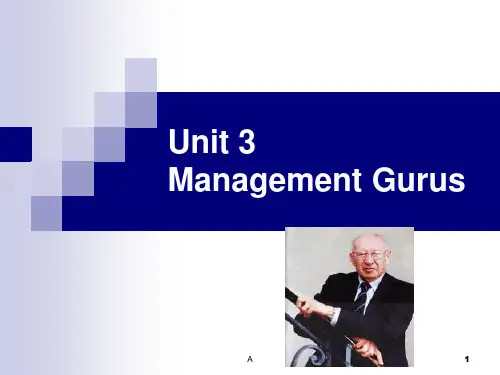
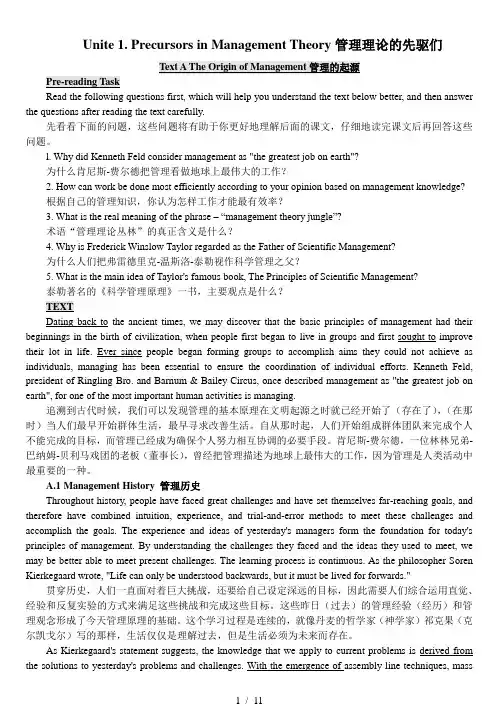
Unite 1. Precursors in Management Theory管理理论的先驱们Read the following questions first, which will help you understand the text below better, and then answer the questions after reading the text carefully.先看看下面的问题,这些问题将有助于你更好地理解后面的课文,仔细地读完课文后再回答这些问题。
l. Why did Kenneth Feld consider management as "the greatest job on earth"?为什么肯尼斯-费尔德把管理看做地球上最伟大的工作?2. How can work be done most efficiently according to your opinion based on management knowledge?根据自己的管理知识,你认为怎样工作才能最有效率?3. What is the real meaning of the phrase –“management theory jungle”?术语“管理理论丛林”的真正含义是什么?4. Why is Frederick Winslow Taylor regarded as the Father of Scientific Management?为什么人们把弗雷德里克-温斯洛-泰勒视作科学管理之父?5. What is the main idea of Taylor's famous book, The Principles of Scientific Management?泰勒著名的《科学管理原理》一书,主要观点是什么?Dating back to the ancient times, we may discover that the basic principles of management had their beginnings in the birth of civilization, when people first began to live in groups and first sought to improve their lot in life. Ever since people began forming groups to accomplish aims they could not achieve as individuals, managing has been essential to ensure the coordination of individual efforts. Kenneth Feld, president of Ringling Bro. and Barnum & Bailey Circus, once described management as "the greatest job on earth", for one of the most important human activities is managing.追溯到古代时候,我们可以发现管理的基本原理在文明起源之时就已经开始了(存在了),(在那时)当人们最早开始群体生活,最早寻求改善生活。
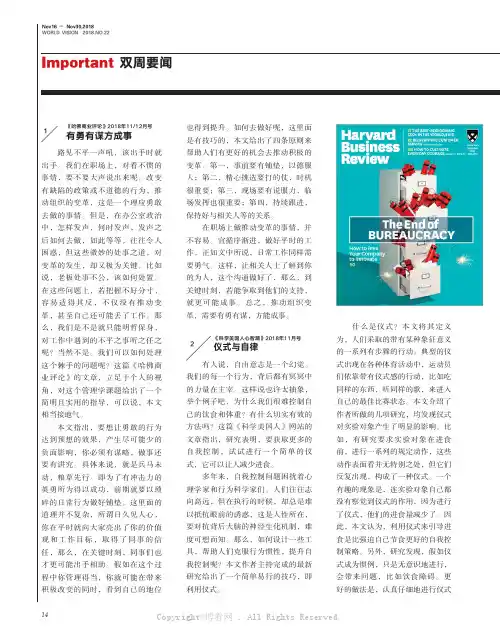
Important 双周要闻Nov16 - Nov30,2018WORLD VISION 2018.NO.22142《科学美国人心智篇》2018年11月号仪式与自律路见不平一声吼,该出手时就出手。
我们在职场上,对看不惯的事情,要不要大声说出来呢。
改变有缺陷的政策或不道德的行为,推动组织的变革,这是一个理应勇敢去做的事情。
但是,在办公室政治中,怎样发声,何时发声,发声之后如何去做,如此等等,往往令人困惑,但这些微妙的处事之道,对变革的发生,却又极为关键。
比如说,老板处事不公,该如何处置。
在这些问题上,若把握不好分寸,容易适得其反,不仅没有推动变革,甚至自己还可能丢了工作。
那么,我们是不是就只能明哲保身,对工作中遇到的不平之事听之任之呢?当然不是。
我们可以如何处理这个棘手的问题呢?这篇《哈佛商业评论》的文章,立足于个人的视角,对这个管理学课题给出了一个简明且实用的指导,可以说,本文相当接地气。
本文指出,要想让勇敢的行为达到预想的效果,产生尽可能少的负面影响,你必须有谋略,做事还要有讲究。
具体来说,就是兵马未动,粮草先行。
即为了有冲击力的英勇所为得以成功,前期就要以琐碎的日常行为做好铺垫。
这里面的道理并不复杂,所谓日久见人心,你在平时就向大家亮出了你的价值观和工作目标,取得了同事的信任,那么,在关键时刻,同事们也才更可能出手相助。
假如在这个过程中你管理得当,你就可能在带来积极改变的同时,看到自己的地位1《哈佛商业评论》2018年11/12月号有勇有谋方成事也得到提升。
如何去做好呢,这里面是有技巧的,本文给出了四条原则来帮助人们有更好的机会去推动积极的变革。
第一,事前要有铺垫,以德服人;第二,精心挑选要打的仗,时机很重要;第三,现场要有说服力,临场发挥也很重要;第四,持续跟进,保持好与相关人等的关系。
在职场上做推动变革的事情,并不容易。
宜循序渐进,做好平时的工作,正如文中所说,日常工作同样需要勇气。
这样,让相关人士了解到你的为人,这个沟通做好了,那么,到关键时刻,若能争取到他们的支持,就更可能成事。
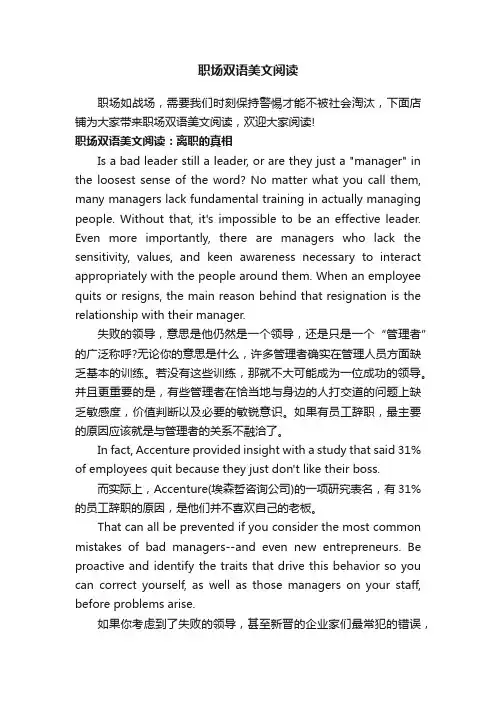
职场双语美文阅读职场如战场,需要我们时刻保持警惕才能不被社会淘汰,下面店铺为大家带来职场双语美文阅读,欢迎大家阅读!职场双语美文阅读:离职的真相Is a bad leader still a leader, or are they just a "manager" in the loosest sense of the word? No matter what you call them, many managers lack fundamental training in actually managing people. Without that, it's impossible to be an effective leader. Even more importantly, there are managers who lack the sensitivity, values, and keen awareness necessary to interact appropriately with the people around them. When an employee quits or resigns, the main reason behind that resignation is the relationship with their manager.失败的领导,意思是他仍然是一个领导,还是只是一个“管理者”的广泛称呼?无论你的意思是什么,许多管理者确实在管理人员方面缺乏基本的训练。
若没有这些训练,那就不大可能成为一位成功的领导。
并且更重要的是,有些管理者在恰当地与身边的人打交道的问题上缺乏敏感度,价值判断以及必要的敏锐意识。
如果有员工辞职,最主要的原因应该就是与管理者的关系不融洽了。
In fact, Accenture provided insight with a study that said 31% of employees quit because they just don't like their boss.而实际上,Accenture(埃森哲咨询公司)的一项研究表名,有31%的员工辞职的原因,是他们并不喜欢自己的老板。
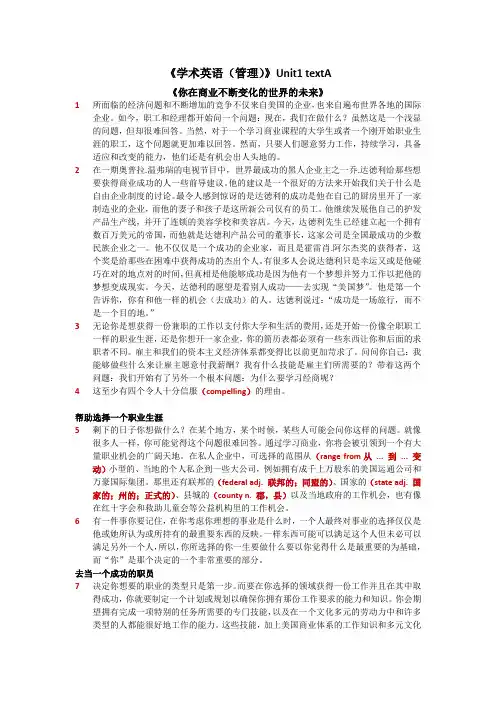
《学术英语(管理)》Unit1 textA《你在商业不断变化的世界的未来》1所面临的经济问题和不断增加的竞争不仅来自美国的企业,也来自遍布世界各地的国际企业。
如今,职工和经理都开始问一个问题:现在,我们在做什么?虽然这是一个浅显的问题,但却很难回答。
当然,对于一个学习商业课程的大学生或者一个刚开始职业生涯的职工,这个问题就更加难以回答。
然而,只要人们愿意努力工作,持续学习,具备适应和改变的能力,他们还是有机会出人头地的。
2在一期奥普拉.温弗瑞的电视节目中,世界最成功的黑人企业主之一乔.达徳利给那些想要获得商业成功的人一些前导建议。
他的建议是一个很好的方法来开始我们关于什么是自由企业制度的讨论。
最令人感到惊讶的是达徳利的成功是他在自己的厨房里开了一家制造业的企业,而他的妻子和孩子是这所新公司仅有的员工。
他继续发展他自己的护发产品生产线,并开了连锁的美容学校和美容店。
今天,达徳利先生已经建立起一个拥有数百万美元的帝国,而他就是达徳利产品公司的董事长,这家公司是全国最成功的少数民族企业之一。
他不仅仅是一个成功的企业家,而且是霍雷肖.阿尔杰奖的获得者,这个奖是给那些在困难中获得成功的杰出个人。
有很多人会说达徳利只是幸运又或是他碰巧在对的地点对的时间,但真相是他能够成功是因为他有一个梦想并努力工作以把他的梦想变成现实。
今天,达徳利的愿望是看别人成功——去实现“美国梦”。
他是第一个告诉你,你有和他一样的机会(去成功)的人。
达徳利说过:“成功是一场旅行,而不是一个目的地。
”3无论你是想获得一份兼职的工作以支付你大学和生活的费用,还是开始一份像全职职工一样的职业生涯,还是你想开一家企业,你的简历表都必须有一些东西让你和后面的求职者不同。
雇主和我们的资本主义经济体系都变得比以前更加苛求了。
问问你自己:我能够做些什么来让雇主愿意付我薪酬?我有什么技能是雇主们所需要的?带着这两个问题:我们开始有了另外一个根本问题:为什么要学习经商呢?4这至少有四个令人十分信服(compelling)的理由。
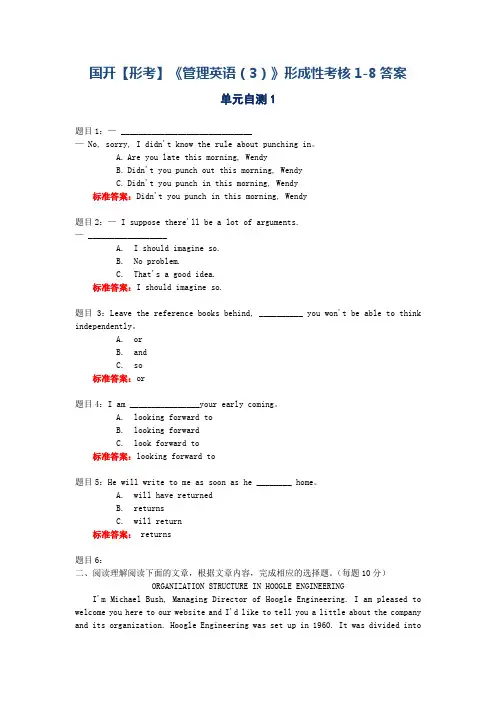
国开【形考】《管理英语(3)》形成性考核1-8答案单元自测1题目1:— ______________________________— No, sorry, I didn't know the rule about punching in。
A.Are you late this morning, WendyB.Didn't you punch out this morning, WendyC.Didn't you punch in this morning, Wendy标准答案:Didn't you punch in this morning, Wendy题目2:— I suppose there'll be a lot of arguments.— __________________A.I should imagine so.B.No problem.C.That's a good idea.标准答案:I should imagine so.题目3:Leave the reference books behind, __________ you won't be able to think independently。
A.orB.andC.so标准答案:or题目4:I am ________________your early coming。
A.looking forward toB.looking forwardC.look forward to标准答案:looking forward to题目5:He will write to me as soon as he ________ home。
A.will have returnedB.returnsC.will return标准答案: returns题目6:二、阅读理解阅读下面的文章,根据文章内容,完成相应的选择题。
商务英语阅读理解(精选5篇)1.商务英语阅读理解第1篇Questions 1-7Look at the statements below and the article about the development of future business leaders on the oppositeWhich section of the article (A, B, C or D) does each statement (1-7) refer to?For each statement (1-7), mark one letter (A, B, C or D) on your Answer You will need to use some of these letters more than1 Managers need to take action to convince high-flyers of their value to the2 Organisations need to look beyond the high-flyers they are currently3 There is a concern that firms investing in training for high-flyers may not gain the benefits4 Managers need expert assistance from within their own firms in developing5 Firms currently identify high-flyers without the support of a guidance6 Managers are frequently too busy to deal with the development of7 Firms who work hard on their reputation as an employer will interest The Stars of the FutureA Existing management research does not tell us much about how to find and develop high-flyers, those people who have the potential to reach the top of an As a result, organisations are left to formulate their own A more effective overall policy for developing future leaders is needed, which is why the London Business School has launched the Tomorrow's Leaders Research Group (TLRG). The group contains representatives from 20 firms, and meets regularly to discuss the leadership development of the organisations'B TLRG recognises just how significant line managers are in the process of leadership Unfortunately, with today's flat organisations, where managers have functional as well as managerial responsibilities, people development all too often falls victim to heavy One manager in the research group was unconvinced by the logic of sending his best people away on development courses, 'only to see them poached by another department or, worse still, another firm'. This fear of losing high-flyers runs deep in the organisations that make up the researchC TLRG argues that the task of management is not necessarily about employee retention, but about creating 'attraction centres'. 'We must help line managers to realise that if their companies are known as ones that develop their people, they will have a greater appeal to high-flyers,' said one Furthermore, selecting people for, say, a leadership development programme is a sign of commitment from management to an Loyalty can then be more easily demanded inD TLRG has concluded that a company's HR specialists need to take action and engage with line managers individually about their role in the development of Indeed, in order to benefit fully from training high-flyers as the senior managers of the future, firms must actually address the development of all managers who will be supporting the Without this, managers will not be in a position to give appropriate And when eventually the high-flyers do move on, new ones will be needed to replace The next challenge will be to find a new generation of2.商务英语阅读理解第2篇give speech to 演说[例] address audience on a business projectadjourn (v) to stop (a court case, a meeting , )for a time before beginning again 延期,休会[例] The board meeting has been adjourned to an uncertain[同义词] postponeadjust (v) to settle an insurance claim 理算保险索赔[例] After the car accident, he made an insurance claim that will be adjustedadministration () organization and control of a company经营、管理[例] The administration power of a company also shows the internal control of the[同义词] managementadmin () abbreviation for administration 经营、管理administer () organize, control: 管理[同义词] manageadopt () choose, decide on采用[例] We adopted a newadvance () money paid before it is due, or for work only partially completed 预付款[例] Yesterday I received an advance on my monthly(v) to increase 提高[例] On bull market , shares are advancing[同义词] increase3.商务英语阅读理解第3篇《Staff appraisals》,员工评估。
管理英语4 · Comprehensive Test亲爱的同学你好,欢迎进入综合练习环节,本练习共包含以下几种题型:一、交际用语:5小题,每小题2分,共10分;二、词汇语法:15小题,每小题2分,共30分;三、阅读理解/听力理解/完形填空(题型随机):2篇,每篇5小题,每小题4分,共40分;四、写作:1篇,共20分。
本练习不限答题次数和时间,可供反复多次练习,成绩不计入形考。
一、交际用语:5小题,每小题2分,共10分。
(难易度:中)2. — If you don't believe in yourself, no one else will.— _____. Confidence is really important.单选题(2.0分)(难易度:中)A. That's not the pointB. I don't think soC. I couldn't agree more正确答案:C正确答案解释:解析:本题考查情景对话。
该题的大意是:如果你自己都不相信自己,别人更不会相信你了。
完全赞成(I couldn't agree more). 自信真的很重要。
由“Confidence is really important.”可知,说话人赞成对方的观点,故选C。
错误答案解释:解析:本题考查情景对话。
该题的大意是:如果你自己都不相信自己,别人更不会相信你了。
完全赞成(I couldn't agree more). 自信真的很重要。
由“Confidence is really important.”可知,说话人赞成对方的观点,故选C。
3. — Could I borrow your iPad for a few hours?—_____________单选题(2.0分)(难易度:中)A. Yes, you can.B. Sure, here you are. Enjoy your time.C. It doesn't matter.正确答案:B正确答案解释:解析:本题考核“征求允许”的交际用语。
Discounts Can Be Dangerous打折很危险by Jeffrey M. Stibel and Peter DelgrossoDuring tough economic times, companies often rush to reduce prices on their products and services. That seems like common sense: People can’t afford to spend as much, so charge less to keep them buying. But discounting has its perils.每当步入经济困难期,许多公司都会争先恐后地降低产品及服务的价格。
这似乎也合乎常理:既然消费者花不起那么多钱,那就降价促销。
殊不知,打折蕴藏着诸多风险。
To be sure, discounting is effective when done wisely and strategically. It can get consumers excited about a product, encourage them to buy more, and help your short-term bottom line. However, whether the purchase is a hot dog, a handbag, or a stay at a five-star hotel, customers want good value for their hard-earned money. The price of something is often an important determinant of its perceived value, as Dan Ariely points out in Predictably Irrational. Often, the more consumers pay, the more value they ascribe to a purchase. If you discount prices purely to boost sales, buyers may begin to question that value.毋庸置疑,如果能站在战略的高度,以高明的手段打折,那肯定有效果。
译言网 | 《哈佛商业评论》专家论点:管理,并不是一种职业/view/162355/124852September 30th, 2010The Big Idea: No, Management Is Not a Profession《哈佛商业评论》专家论点:管理,并不是一种职业by Richard Barker作者:Richard BarkerIt is natural to view management as a profession. Managers’ status issimilar to that of doctors or lawyers, as is their obligation tocontribute to the well-being of society. Managers can also be formallytrained and qualified, notably by earning an MBA. If management is aprofession, the business school is a professional school.人们一般认为,管理是一种职业,而经理人的地位类似于医生或律师,他们都对社会做出了杰出的贡献。
经理人大多进行过系统学习和正规训练,个别优秀的会有MBA学位。
如果我们把管理看成是一种职业的话,那么“商学院”就和“职业学校”没有分别了。
That perception has fueled criticism of business schools during therecent economic crisis. They have come under fire for allegedly failingin their obligation to educate socially responsible business leaders.The same perception has informed the schools’ response, which has beento work toward greater professionalism. Writing in the June 2009 issueof Harvard Business Review, Joel Podolny, a former dean of the YaleSchool of Management, argued, “An occupation earns the right to be aprofession only when some ideals, such as being an impartial counsel,doing no harm, or serving the greater good, are infused into the conductof people in that occupation. In like vein, a school becomes aprofessional school only when it infuses those ideals into itsgraduates."这种看法在最近的经济危机中招致了许多批评,责怪那些商学院没有培养出具备社会责任感的商界领袖。
同样,越来越职业化的学校也对这种看法做出了回应,耶鲁大学管理学院前院长Joel Podolny在2009年6月的《哈佛商业评论》上的一篇文章里这样说道:“一种职业之所以被称之为‘职业’,是因为(所提出的)一些想法可以获得公众行为准则的认可,比如一位公正的律师,不仅可以服务大众,而且对社会无害。
就像血管一样,只有学生们接受了那些想法,学校才有可能变得更加职业化。
”Podolny is in sympathy with Harvard Business School professors RakeshKhurana and Nitin Nohria, who argued in the October 2008 issue of HBRthat it was time to make management a true profession. In their view,“True professions have codes of conduct, and the meaning andconsequences of those codes are taught as part of the formal educationof their members.” Yet, they wrote, “unlike doctors and lawyers,”managers don’t “adhere to a universal and enforceable code ofconduct.”Podolny和哈佛商学院教授Rakesh Khurana与Nitin Nohria的观点一致,他们在发表于2008年10月《哈佛商业评论》的文章中谈到已经是时候将管理变成一种真正的职业了,在他们看来,“真正的职业有自己的行为准则,而从事这项职业的人一定接受过关于这些准则的含义与重要性的教育”,他们还说,“与医生和律师不同”,经理人不会“局限于那些普遍的、可执行的行为准则”。
These calls to professionalism are hardly new. Writing in the very firstissue of HBR, in 1922, HBS professor John Gurney Callan claimed,“Business...may be thought of as a profession [and] we may profitablyspend a good deal of time in considering what is the best professionaltraining for [those] who are to take important executive positions inthe coming generation.”其实这种关于“职业”的说法早就不新鲜了,在1922年,哈佛商学院教授John GurneyCallan在《哈佛商业评论》上就声称:“企业管理……或许应该被称为是一种职业,我们要用大部分时间来考虑如何为那些将要身居管理要职的人们提供最好的职业训练!”A. Lawrence Lowell, the president of Harvard University, was even moreassertive in his 1923 HBR essay “The Profession of Business” (adaptedfrom his address to the incoming class at HBS the previous September).He attributed the very creation of HBS to the emergence of businessmanagement as a distinct profession.哈佛大学校长wrence Lowell在1923年《哈佛商业评论》上的评论文章《企业管理中的职业》(改编自他1922年9月的讲课内容)中的态度更加自信,他认为哈佛商学院独具创造性地把企业管理培养成了一种明确的职业。
In contrast with these views, I will argue that management is not aprofession at all and can never be one. Therefore, business schools arenot professional schools. Moreover, laudable and beguiling thoughprofessional standards and ethics may be, and however appealingprofessional status is, hanging the mantle “professional” on businesseducation fosters inappropriate analysis and misguided prescriptions.和这些看法相反,我认为管理不是一种职业,并且永远不会是;同时,商学院也是不职业学校;此外,不管如何来判定职业道德的好坏,职业地位有多么诱人,打着“职业化”名头的企业管理教育只会培养出错误的分析与解决办法。
Let’s begin by examining what actually constitutes a profession.下面,我们先来看一看“职业”是怎么构成的。
What Is a Profession?什么是职业?Professions are made up of particular categories of people from whom weseek advice and services because they have knowledge and skills that wedo not. A doctor, for example, can recommend a course of treatment foran illness; a lawyer can advise us on a course of legal action. Wecannot make these judgments ourselves—and often we cannot judge thequality of the advice we receive. The Nobel laureate Kenneth Arrow wrote2010-9-30译言网 | 《哈佛商业评论》专家论…q yabout the medical profession, “The value of information is frequentlynot known in any meaningful sense to the buyer; if, indeed, he knewenough to measure the value of information, he would know theinformation itself. But information, in the form of skilled care, isprecisely what is being bought from most physicians, and, indeed, frommost professionals.”职业由一群特定的、可以为我们提供意见或服务的人组成,这些人拥有我们所没有的知识和技能,举例来说,医生可以告诉我们如何对疾病进行治疗;律师可以告诉我们如何进行诉讼,而我们对这些事无法做出自己的判断,同时也无从得知所得到建议的质量。